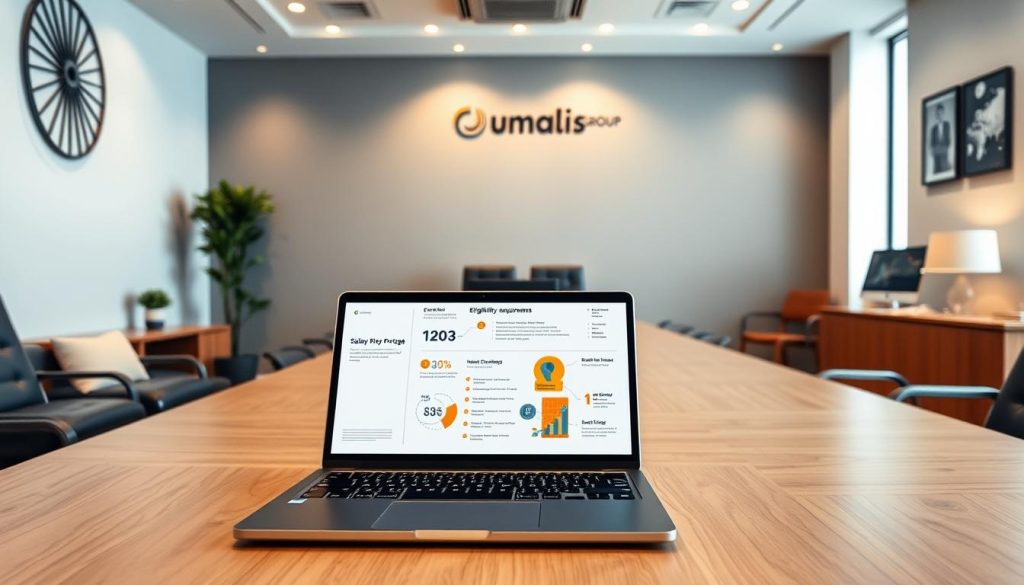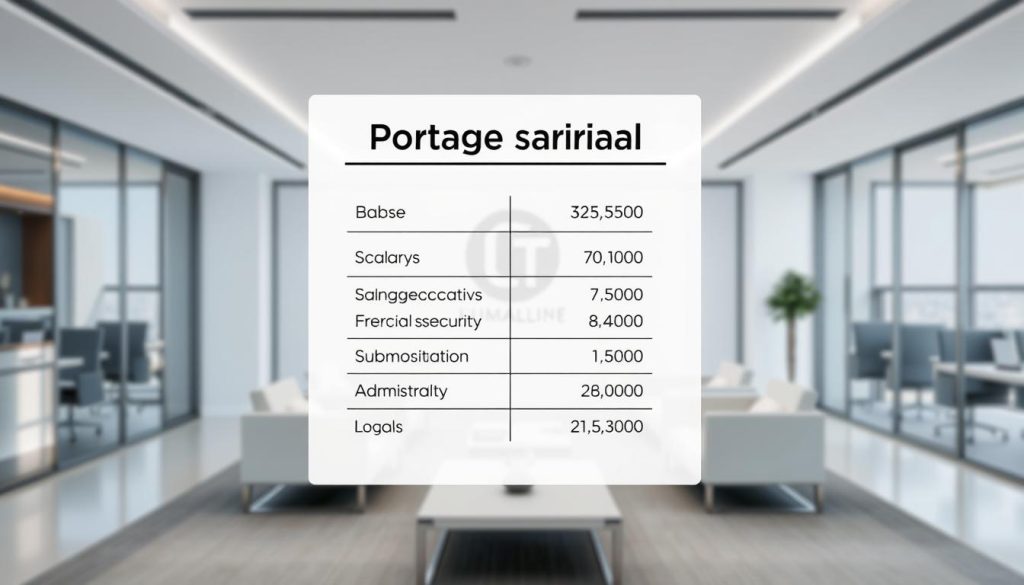Imagine a professional path where over 70,000 independent consultants in France enjoy complete autonomy without sacrificing the safety net of traditional employment. This is the powerful reality of salary portage.
This innovative model creates a unique partnership. It connects you, the skilled professional (salarié porté), with a specialized portage entreprise and your end client. You focus entirely on your travail and growing your activité.
The portage company handles the complex administrative, legal, and financial tasks. This structure provides a remarkable blend of freedom and security. It is an ideal solution for qualified experts seeking a stable and supported independent career.
We will guide you through the mechanics of portage salarial. You will understand how this arrangement protects your rights and simplifies your professional life.
Table of Contents
Key Takeaways
- Salary portage offers a hybrid model combining independence and employment security.
- It is a popular choice for tens of thousands of independent professionals in France.
- The system involves a three-way relationship between you, the portage company, and the client.
- It significantly reduces administrative burdens for the independent worker.
- This model provides access to valuable social protections and employment rights.
- It is designed for qualified professionals seeking stability in their independent careers.
Introduction to Salary Portage
Professional independence doesn’t have to mean sacrificing the protections of traditional employment. This innovative arrangement creates a unique hybrid model that combines the best of both worlds.
As a salarié porté, you maintain full autonomy in finding clients and negotiating your terms. Meanwhile, the specialized entreprise handles administrative burdens like payroll and legal compliance.
The framework operates through three interconnected relationships:
| Role | Responsibility | Benefit |
|---|---|---|
| Carried Employee | Client acquisition & service delivery | Professional autonomy |
| Portage Company | Administrative & legal support | Employment security |
| End Client | Project specifications & payment | Quality service |
« True professional freedom means having the support system to focus on what you do best. »
This structure is built on three key contracts: your employment agreement, the commercial contract with the client, and your negotiated terms. The system is specifically designed for qualified professionals who value both independence and stability.
You gain access to comprehensive social protections while directing your own career path. This model provides a secure foundation for sustainable professional growth.
Key Advantages of Portage Salarial for Professionals
The advantages of choosing portage salarial extend far beyond basic employment protections, offering a complete ecosystem for professional success.
As a salarié porté, you receive comprehensive sécurité sociale coverage identical to traditional employees. This includes health insurance, retirement benefits, and unemployment protection.
The administrative burden disappears completely. Your entreprise de portage handles all payroll, tax declarations, and regulatory compliance.
Professional development becomes accessible through various training programs. You can utilize personal training accounts and skills assessments to grow continuously.
Financial security is guaranteed with minimum salary protections. Structured payment schedules help manage income fluctuations between missions.
Your professional credibility increases significantly. Presenting yourself as an employee of an established portage company enhances client trust.
Occupational health services ensure your well-being throughout your professional activity. The company arranges all required medical examinations.
Networking opportunities connect you with other independent professionals. This community support system fosters collaboration and knowledge sharing.
This model transforms how you approach your independent travail. It provides the stability needed for sustainable career growth.
Understanding the Mechanics of Salary Portage
The operational framework of portage salarial transforms client payments into secure employee compensation through a transparent financial process. This system ensures you receive stable income while maintaining professional independence.
Overview of the Process
When you secure a client prestation, the financial journey begins with the client company paying the entreprise portage. This payment covers your professional services and initiates the salary conversion mechanism.
The portage company then processes this revenue through a structured system. They deduct management fees and social contributions before transforming the remaining amount into your salary.
Step-by-Step Salary Transformation
As a salarié porté, you typically receive payments in two installments. The first payment provides immediate financial stability upon validation of your monthly activity report.
This initial amount represents approximately 77% of the social security ceiling. It serves as a guaranteed minimum salary during the payment cycle.
The second payment occurs after the client settles the invoice with your entreprise. This complement reflects the remaining balance from your activity account, minus applicable fees.
Your activity account tracks all financial movements transparently. You receive detailed monthly statements showing exactly how your earnings are calculated from gross revenue to net salary.
This financial transformation typically involves management fees ranging from 5-10%. The system also includes built-in reserves to support you during periods between missions.
Comment fonctionne le portage salarial: A Detailed Explanation
The journey through salary portage follows a systematic eight-step workflow that ensures both professional freedom and employment stability. This process transforms your independent consulting work into structured employment with comprehensive benefits.
Your path begins with securing a client engagement. As an independent professional, you negotiate terms directly with the client company. The portage organization does not provide assignments—your business development skills drive success.
Before proceeding, verify your engagement meets specific criteria. Ensure the duration stays within 36 months and your daily rate supports minimum salary requirements. Certain regulated professions may have restrictions.
Selecting your portage partner is crucial. Consider their reputation, support services, and fee structure. You’ll also choose between fixed-term or permanent employment contracts based on your career goals.
The commercial agreement formalizes your client relationship. Your chosen company handles this paperwork, typically within two business days. This establishes the legal framework for service delivery.
During mission execution, you maintain professional autonomy while the client oversees work conditions. Your focus remains on delivering quality services according to negotiated terms.
Monthly activity reporting is essential. You document worked hours or days, which the portage company validates for payroll processing. This ensures accurate compensation and workload management.
The final step involves receiving your salary in structured payments. You get an initial guaranteed amount upon report approval, with the balance following client payment. This systematic approach provides financial predictability while maintaining your social security protections throughout your independent career.
Legal and Contractual Framework in Portage Salarial
Contractual clarity forms the backbone of this hybrid employment structure, offering defined rights and responsibilities. The industry operates under a comprehensive collective agreement established in March 2017, providing robust protections for all parties involved.
Your employment relationship in portage salarial follows two primary contract types, each designed for different professional circumstances. Understanding these options helps you make informed decisions about your career path.
CDD Contract Essentials
Fixed-term contracts (CDD) are ideal for project-based work with specific client engagements. These agreements have a maximum total durée of 18 months, including up to two renewals.
The contrat travail must be delivered within two business days after conclusion. It clearly outlines the service objectives and termination conditions, ensuring transparency throughout your mission.
CDI Contract Specifics
Permanent contracts (CDI) provide greater employment stability for professionals working with multiple clients. While standard labor law provisions apply, periods without client missions are not remunerated.
This contrat type offers continuous employment status while acknowledging the variable nature of consulting travail. The framework balances security with the flexibility needed for independent professional activity.
| Contract Type | Maximum Duration | Renewal Options | Remuneration During Breaks |
|---|---|---|---|
| CDD (Fixed-term) | 18 months total | Up to 2 renewals | Mission-based only |
| CDI (Permanent) | Continuous | Not applicable | Client mission dependent |
Both contract types must include essential elements defined by Labor Code article provisions. This ensures complete transparency regarding remuneration calculations and professional expense handling.
Eligibility and Professional Requirements

The pathway to becoming a salarié porté involves verifying your professional readiness through established criteria. This framework ensures the model serves experienced professionals who can operate independently.
Qualification Criteria
To qualify for this arrangement, you must hold at minimum a level 5 professional qualification. This typically means a Bac +2 equivalent, such as a BTS or DUT diploma.
Alternatively, significant experience of at least three years in your activité sector serves as valid qualification. This dual-path approach makes the system accessible to various professional levels.
Experience and Autonomy Requirements
Demonstrating true autonomie is essential for success as a salarié in this model. You must independently prospect for entreprise cliente opportunities and negotiate service terms.
Your capacity to organize work schedules and manage task distribution confirms professional maturity. The portage company provides administrative support but cannot direct your service delivery methods.
| Qualification Path | Minimum Requirement | Professional Level | Autonomy Verification |
|---|---|---|---|
| Academic | Level 5 (Bac +2) | Technician/Supervisory | Client negotiation ability |
| Experience-based | 3+ years in sector | Executive (automatic) | Independent work organization |
These requirements ensure portage salarial supports genuine independent professionals. The system maintains its purpose of combining entrepreneurial freedom with employment security for qualified experts.
Navigating Client Relationships in Portage Salarial
Effective client relationship management begins with clarity about the regulatory boundaries that define when companies can engage your specialized services. As a salarié porté, you operate within specific legal parameters that protect both your independence and the entreprise cliente‘s operational integrity.
Client organizations can only engage your expertise for two specific scenarios. The first involves occasional tasks outside their normal business activities. The second requires specialized knowledge they lack internally. Each prestation must have a clear, fixed-term objective with a maximum 36-month duration.
Your professional autonomy shines during the negotiation phase. You directly establish service scope, execution conditions, and pricing with the client. The portage company then formalizes these terms into a commercial agreement.
While delivering services on client premises, the entreprise cliente assumes responsibility for your work environment. This includes health and safety measures, working hours compliance, and necessary equipment provision.
Successful relationships in portage salarial depend on clear communication about deliverables and expectations. Maintain professional boundaries that respect both your independence and the client‘s operational needs throughout the engagement.
Selecting the Right Portage Salarial Company
Navigating the landscape of available portage providers requires careful consideration of multiple strategic factors. Your choix of an entreprise portage salarial significantly influences your financial outcomes and professional support system.
Evaluating Financial Security and Support
When assessing potential partners, look beyond basic management frais gestion. Comprehensive financial optimization involves examining additional charges, revenue transformation tools, and net salary calculations.
Different entreprise portage organizations offer varying levels of accompagnement and training. This support becomes particularly valuable when launching your independent activity.
Verify the financial sécurité of your chosen provider. Investigate their operational history and confirm they maintain adequate financial garantie levels as required by regulations.
- Professional network integration facilitates connections with other independent experts
- Digital management tools should simplify daily administrative tasks
- Transparent fee structures ensure clear understanding of financial arrangements
Your final choix should balance financial optimization with substantive support services. The ideal entreprise portage salarial provides both operational efficiency and genuine professional guidance.
Crafting Your Contract: CDD vs CDI Insights
Your employment agreement serves as the foundation for your successful journey as an independent professional. Selecting between fixed-term and permanent arrangements requires careful consideration of your career objectives.
We guide you through both contract types to ensure your contrat travail aligns perfectly with your professional needs. This decision impacts your financial stability and long-term growth.
Key Elements in CDD Contracts
Fixed-term agreements (CDD) are ideal for initial engagements. They specify the exact durée of your mission with clear start and end dates.
These contrat arrangements include renewal options and compensation details. The entreprise handles all administrative aspects while you focus on service delivery.
Understanding CDI Provisions
Permanent contracts (CDI) offer greater employment security for established professionals. This contrat travail type suits those with consistent client engagements.
Unlike traditional arrangements, intermission période between missions are not remunerated. Your ability to maintain regular travail is essential for financial continuity.
| Contract Feature | CDD (Fixed-term) | CDI (Permanent) |
|---|---|---|
| Ideal For | First missions, short-term projects | Established professionals with regular work |
| Duration Flexibility | Specific mission durée | Continuous employment status |
| Income During Breaks | Mission-based only | Client engagement dependent |
| Transition Path | Initial entry point | Long-term career stability |
The right contrat choice depends on your current professional situation. Both options provide the framework for successful portage salarial engagement.
Financial and Remuneration Essentials

Your compensation structure combines guaranteed security with performance-based earnings. This framework ensures you maintain financial stability while pursuing independent professional success.
We guide you through the essential financial components that make this model both secure and transparent.
Salary Breakdown and Minimum Guarantees
The legally mandated salaire minimum provides a solid foundation for your financial planning. For full-time equivalent work, your gross monthly rémunération cannot fall below €2,517.13.
Your guaranteed monthly salaire varies based on experience level and contract type. Junior professionals receive 70% of the social security plafond, while senior experts qualify for 75%.
This minimum salaire integrates three key elements: your base compensation, paid leave allowances, and a mandatory 5% business development bonus.
Management Fees and Deductions
Portage companies typically charge frais gestion ranging from 5-10% of your invoiced amount. These frais cover administrative services, payroll processing, and legal compliance.
The deduction sequence follows a transparent path. From your negotiated service price, the company first deducts management frais, then social security contributions.
- Financial reserves support you during intermission periods
- Monthly statements provide complete transaction transparency
- Daily rates near €300 ensure minimum salary requirements are met
This system guarantees that every financial aspect of your portage salarial arrangement remains clear and manageable throughout each mois of activity.
Risk Management and Social Security Benefits
Multiple safety layers work together to shield your independent career from financial and professional uncertainties. This comprehensive protection system ensures your travail remains secure throughout your journey as a salarié porté.
As part of the portage salarial framework, you gain access to unemployment insurance. This provides crucial income support during mission gaps. You can even combine the return-to-work allowance with earnings from your portage activity.
Your entreprise portage handles all occupational health obligations. They arrange medical examinations and prevention visits to protect your well-being. This ensures your physical health remains a priority throughout your professional travail.
Professional development opportunities are extensive for salariés in this system. You can access off-hours training, skills assessments, and personal training accounts. These resources help you grow continuously as a salarié porté.
Financial guarantees provide additional security. Each entreprise portage must maintain reserves to cover salaries and contributions. This protects you in case of company default, reducing your financial risk significantly.
The complete social security package includes health insurance and retirement benefits. This comprehensive safety net allows you to focus on your professional goals with confidence. Your independent career gains the stability of traditional employment through portage salarial.
Practical Steps for Securing and Executing a Mission
The practical implementation of your independent career involves two critical phases: securing client work and maintaining accurate activity documentation. These processes ensure your professional success within the framework.
Securing Client Missions
Your primary responsibility is identifying and securing engagements with client companies. While your administrative partner provides support, you drive business development.
Effective strategies include leveraging professional networks and online platforms. Some organizations offer guidance to refine your service offering for better market positioning.
Commercial agreements should be finalized within two business days of starting work. This protects all parties and formalizes the engagement properly.
Reporting and Account Activity
Each month requires detailed activity reporting. Your compte rendu d’activité documents all professional time, including service delivery and business development.
The activity account provides complete financial transparency. You see client payments, management fees, and net remuneration clearly.
This reporting cycle repeats regularly, creating predictable compensation timing. Accurate documentation ensures proper payroll processing.
| Mission Phase | Your Responsibility | Timeline Requirement |
|---|---|---|
| Client Acquisition | Independent prospecting and negotiation | Ongoing process |
| Contract Formalization | Provide necessary details | Within 2 business days of start |
| Service Execution | Deliver professional prestation | According to agreed schedule |
| Monthly Reporting | Complete activity compte | End of each mois |
Optimizing Your Earnings in Salary Portage
Financial optimization begins with understanding how to structure your service pricing for maximum benefit. Your rémunération potential depends directly on strategic negotiations with each entreprise cliente.
Negotiation Strategies
Establish a baseline daily prix near €300 excluding taxes to meet minimum requirements. This accounts for management fees and social contributions while ensuring adequate salaire levels.
Justify premium pricing by emphasizing your specialized expertise and the unique value of each prestation. Quantify how your services address specific client needs that internal resources cannot fulfill.
Long-Term Earnings Optimization
Consistently secure missions above minimum thresholds and negotiate rate increases during contract renewals. Diversify your client portfolio to maintain steady income flow throughout your portage arrangement.
Leverage the activity account system to manage fluctuations. Higher negotiated prix create reserves that convert to additional salaire installments, enhancing financial flexibility in portage salarial.
Managing Periods of Inactivity and Financial Stability
Maintaining financial stability requires careful planning for the natural ebb and flow of consulting work. Unlike traditional employment, time between client missions in portage salarial is not remunerated.
For CDI contracts, your entreprise portage automatically sets aside 10% from each mission into a reserve fund. This creates a financial cushion specifically for intermission période support.
These breaks between assignments can be strategically used for business development and skill enhancement. You maintain professional momentum while searching for new opportunities.
The accumulated reserve serves multiple purposes during inactive activité phases. It helps cover living expenses and funds your search for the next engagement.
| Reserve Fund Use | Benefit | Planning Consideration |
|---|---|---|
| Income support | Basic financial security | Bridge between missions |
| Business development | Future opportunity creation | Investment in growth |
| Professional expenses | Sustained operations | Maintains momentum |
Before choosing a CDI contract, honestly assess your ability to secure consistent travail. Your seniority as a salarié porté counts only active service periods.
We recommend diversifying your client portfolio and maintaining additional savings. This approach ensures you can navigate the variable nature of independent activité with confidence.
Conclusion
Your journey toward professional independence now has a clear path forward with the comprehensive framework of portage salarial. This guide has illuminated how this model successfully merges entrepreneurial freedom with employment security.
As a salarié porté, you gain access to vital social protections while maintaining control over your professional activité. The administrative support from your chosen entreprise allows you to focus entirely on your core travail and client relationships.
Success in this arrangement requires understanding both the benefits and responsibilities. You must actively secure missions while the system provides financial stability and legal safeguards.
This portage solution represents an ideal balance for qualified professionals seeking sustainable independence. It transforms how you approach your career, offering the best of both employment worlds.
FAQ
What is salary portage?
Salary portage is a professional framework that allows independent consultants to operate with the security of an employment contract. You perform your missions for client companies, while a portage company manages your administrative, payroll, and social security obligations, ensuring you benefit from full employee status.
How does the payment process work?
Your client pays the portage company for your services. The company then deducts its management fee, social security contributions, and other applicable charges. Your net salary, along with a detailed breakdown, is transferred to you on a regular payday, just like a traditional employee.
What are the main advantages for a consultant?
The key benefits include comprehensive social security coverage (health insurance, unemployment benefits, retirement), simplified administration, and enhanced credibility with clients. It provides the autonomy of freelancing with the financial stability and legal protections of salaried employment.
What types of work contracts are available?
Portage salarial primarily uses two contract types: a Fixed-Term Contract (CDD) aligned with a specific mission’s duration, or a Permanent Contract (CDI) that offers continuous employment, even between assignments, providing greater income stability.
Are there minimum activity or income requirements?
Yes, to be eligible, you must generally demonstrate professional autonomy and have a certain level of experience. Your remuneration must also respect the legal minimum wage after deductions. The portage company will assess your profile to ensure it meets the necessary criteria.
How do I handle periods without a client mission?
Your situation depends on your contract type. With a CDI, you may receive a guaranteed minimum salary during short inactivity periods. With a CDD, your contract is tied to a mission. It’s crucial to build a client network and manage your activity account to minimize gaps between projects.
What should I look for when choosing a portage company?
Prioritize companies with a strong reputation, transparent fee structures, and robust financial health. Evaluate their client support services, the clarity of their remuneration statements, and their adherence to the collective bargaining agreement for the portage salarial sector.
How are management fees calculated?
Management fees are a percentage of your mission’s billing rate. This covers the cost of payroll administration, social security contributions, and other support services. The exact percentage varies by company and should be clearly outlined in your service agreement before you sign.





